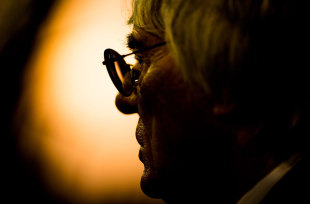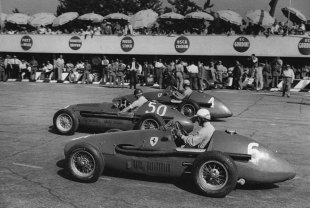

I don't suppose at 84 years of age you care too much about what people think. That's the only explanation I can offer for Bernie Ecclestone's remark about F1 not needing the younger generation; a statement that adds more confusion in the minds of casual F1 viewers already struggling with Mr. E's double-points concept.
In an extension of the thought in a previous column that Ecclestone appears not to understand that time has moved on and, in his position, it's perhaps a good idea to go with it, maybe Bernie is still living in the day when he was a dapper young man hustling used cars and motorcycles in south London.
That would take us to the early 1950s, back in the day when having a 12-inch black and white television set at home was the equivalent of erecting an 85-inch LED TV with inSmart 3D 4k Ultra boasting a 1000Hz processing rate and 5-speaker surround sound in every room and costing a mere £34,999 each.
Don't be fooled by the techno knowledge: I nicked the jargon from a Curry's ad. But you get my point. Bernie was living in an era when life seemed to be moving rapidly but was positively pedestrian by today's standards. This was when newspapers lauded the first non-stop transatlantic flight by a jet aircraft (a Canberra bomber; not a commercial airliner). The telephone - a luxury item in most working class homes - was the only means of communication apart, of course, from handwritten letters entrusted to the General Post Office for delivery a couple of days later.
These were also the days when the F1 World Championship had just been invented and no one would have dreamed of suggesting double points for the final of a mere eight rounds (not counting the Indianapolis 500) in, say, 1953. Had the gimmick been accepted at that year's Italian Grand Prix, the irony is it would have made a travesty of the World Championship.
Instead of the title going to Alberto Ascari, it would have been won by Juan Manuel Fangio, a turn of events that the young Ecclestone, even with his 'modern' thinking at the time, would surely have found ridiculous. It's also reasonable to suggest that the fair-minded Fangio would have been deeply embarrassed by the accolade after winning just a single Grand Prix to Ascari's five.

Indeed, if anything, the last race at Monza would have exacerbated the point since Ascari spun at the final corner while heading a wheel-to-wheel battle with Giuseppe Farina and Fangio, allowing the Argentine to take his only win a couple of hundred metres later. By doubling the existing points (eight for a win, six for second, four for third, and taking into account a bizarre system in which drivers could only count their four best results), Ascari would have been 2.5 points behind Fangio instead of 6.5 points in front.
Saying all that - and just to cloud a silly concept even further - in the 10 seasons when double points would have changed the outcome, only three of switches of position would, in my humble opinion, have seemed reasonable. They are: Stirling Moss instead of Fangio in 1956; Moss instead of Mike Hawthorn in 1958 and, dare I say it, Felipe Massa instead of Lewis Hamilton in 2008.
I know the latter is debatable and there is no room for 'ifs' and 'buts', but I can't help but think of the 'Crashgate' scandal and Massa's resulting and disastrous pit stop while leading the race in Singapore. We could talk about that one until Nelson Piquet Junior agrees he was as guilty as anyone when proposing such a scandalous scheme.
In 1956, Fangio won the title thanks to the generosity of Peter Collins, who stopped and handed over (as was permitted at the time) his Ferrari after Fangio's had broken down. Had double points been on offer, it's interesting to speculate whether or not the Englishman would have so selfless since his chances of winning the championship would have been much stronger. The answer is it probably would have made no difference when you take into account Collins's self-effacing nature and an apparent reluctance to step into the limelight that would have come with the office of being the first British World Champion.
In Abu Dhabi next weekend, there will be no such reticence on the part of either Mercedes driver. The only thing to say in the event of an incident that eliminates Hamilton through no fault of his own is that Ecclestone might understand the unfairness of it all if he stays stuck in the past and recalls Monza 1953.
Enjoy Maurice's blogs? Vote for him in the UK Blog Awards
Maurice Hamilton writes for ESPN F1.
© ESPN Sports Media Ltd.
 Maurice Hamilton writes for ESPN F1. A veteran journalist in the paddock, Maurice Hamilton has been part of the Formula One scene since 1977 and was the Observer's motor racing correspondent for 20 years. He has written several books as well as commentating on Formula One for BBC Radio 5 Live
Maurice Hamilton writes for ESPN F1. A veteran journalist in the paddock, Maurice Hamilton has been part of the Formula One scene since 1977 and was the Observer's motor racing correspondent for 20 years. He has written several books as well as commentating on Formula One for BBC Radio 5 Live
